九年级英语课件 Unit 2 Section A-1
合集下载
Unit2Section A 1a-2b课件2024-2025学年人教版英语九年级全册
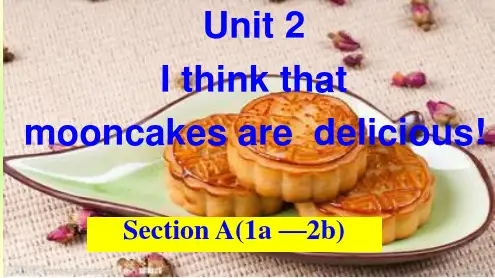
1. He visited his relatives / friends / classmates。
2. He enjoyed eating out / shopping / the Dragon Boat Festival best.
泰国清迈
1. Why is Clara going to Chiang Mai in the hottest month? Because there is a Water Festival.
2. Mary thinks that the teams
TF
were fantastic.
3. Bill wonders whether they’ll T F have zongzi again next year.
4. Bill and Mary believe that
they’ll be back next year to watch the races.
Beijing
4. __c__ The Lantern Festival in Jiangxi
感叹句
用来表达喜、怒、哀、乐等强烈 感情的句子叫感叹句。感叹句一般 用what或how引导,句末用感叹号。
what修饰名词 how修饰形容词或副词。
what引导的感叹句: 1) What + a/ an + adj. + 可数单数(+主谓语)!
TF
2a Listen and circle the correct words.
1. Wu Ming and Harry are cousins / strangers / friends.
2. Wu Ming went to Singapore /
2. He enjoyed eating out / shopping / the Dragon Boat Festival best.
泰国清迈
1. Why is Clara going to Chiang Mai in the hottest month? Because there is a Water Festival.
2. Mary thinks that the teams
TF
were fantastic.
3. Bill wonders whether they’ll T F have zongzi again next year.
4. Bill and Mary believe that
they’ll be back next year to watch the races.
Beijing
4. __c__ The Lantern Festival in Jiangxi
感叹句
用来表达喜、怒、哀、乐等强烈 感情的句子叫感叹句。感叹句一般 用what或how引导,句末用感叹号。
what修饰名词 how修饰形容词或副词。
what引导的感叹句: 1) What + a/ an + adj. + 可数单数(+主谓语)!
TF
2a Listen and circle the correct words.
1. Wu Ming and Harry are cousins / strangers / friends.
2. Wu Ming went to Singapore /
仁爱版九年级英语上册课件Unit 2 Topic 1 Section A 1

Two years ago
Now
1. It was a __b_e_a_u_t_if_u_l_p_la_c_e__. 1.T_h_e__fl_o_w_e_r_s__a_n_d_g_r_a_s_s_
2. There were
have gone.
__lo_t_s__o_f _fl_o_w_e_r_s__a_n_d_g_r_a_s_s_. 2. The water is _s_o__d_i_rt_y_and
_b_e_e_s_a_n_d__b_u_t_te_r_fl_i_es__d_a_n_c_i_n.g ___w_a_s_t_e_w_a_t_e_r___ into the
stream.
4. __E__v_e_ry_t_h_in__g__has changed.
2 Work in pairs. Look at the pictures and make up conversations similar to the example with your partner.
__P__ beautiful __P__ butterflies __N__ dirty
__P__ grass __N__ terrible __N__ factory
__P__ bees __P__ fresh
__P__ clean
__N__waste water
1c Read 1a and complete the sentences in the table. Then retell 1a to your partner.
6
4
1
2
3
5
B. Listen again and complete the sentences.
人教版九年级上学期英语课件: Unit2(共35张PPT)
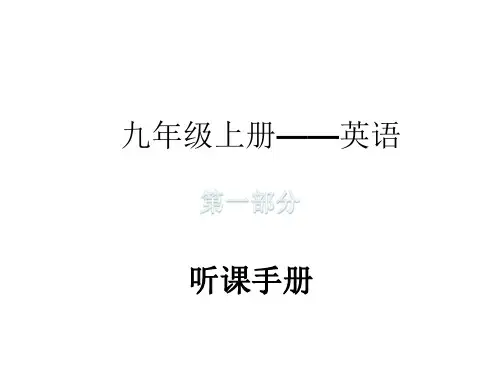
九年级上册Unit 2
例题跟踪演练 (B ) 4. (2017内蒙古呼和浩特) There are fifty students in Class One. Twenty of them are boys, __________ are girls. A. the other B. the others C. others D. anther 解析:本题考查代词。根据句意可知twenty boys是fifty students里面的一部分,而横线处 表示特定的另一部分且横线处作为are的主语。
九年级上册Unit 2
A rooster lying on the ground lied that he laid an egg yesterday. 一个躺在地上的公鸡撒谎说他昨天下了一颗 蛋。 He lay on the floor, reading a book. 他躺在地板上看书。 The small town lies among the mountains. 小镇位于群 山之中。 I’m sorry I lied to you. 我很抱歉向你撒了谎。 He laid the book on the table. 他把书放在了桌子上。
九年级上册Unit 2
例题跟踪演练 ( A ) 3. When she came back a few days later, she found that all things still ______ where she had ______ them. y; laid id; laid y; lain D.lying; lain 解析:本题考查辨析易混词。根据句意可知第一个横线 处动词的主语是all things, 所以动词表达的是位于;第 二个横线处动词的主语是she,所以动词表达的是放置。 且整个句子是用的是过去时态。
新目标英语九年级Unit 2全单元课件
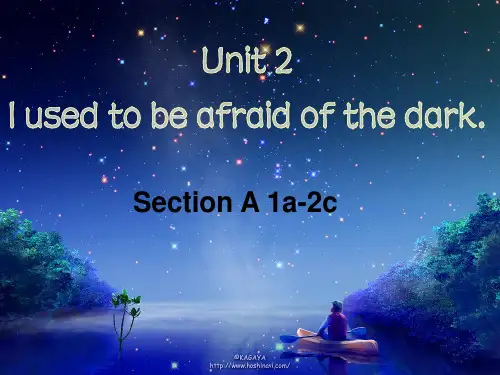
edium height short
long hair short hair straight hair
build
heavy
hair
medium build
thin
have/has (big) eyes,
curly hair blonde hair brown hair ……
you? B: Yes, I did. / No, I didn’t.
Listen and check √( ) the words you hear.
_____shy
______ serious
__√___friendly ______ funny __√___ outgoing ___√__ quiet
wear(s) glasses/clothes …
He was short when he was a child, but he is tall now.
He used to be short, but now he is tall.
quiet …
outgoing …
She used to be …, but now she is … .
What did you use to eat ? What do you eat now?
Activity Eat…. Read…
Watch…on TV Do…at school
Past
Now
What did you use to eat ?
What do you eat now?
Activity
My partner used to be is still afraid of… afraid of….
the dark being alone snakes flying in an airplane big dogs high places speaking in front of a group
long hair short hair straight hair
build
heavy
hair
medium build
thin
have/has (big) eyes,
curly hair blonde hair brown hair ……
you? B: Yes, I did. / No, I didn’t.
Listen and check √( ) the words you hear.
_____shy
______ serious
__√___friendly ______ funny __√___ outgoing ___√__ quiet
wear(s) glasses/clothes …
He was short when he was a child, but he is tall now.
He used to be short, but now he is tall.
quiet …
outgoing …
She used to be …, but now she is … .
What did you use to eat ? What do you eat now?
Activity Eat…. Read…
Watch…on TV Do…at school
Past
Now
What did you use to eat ?
What do you eat now?
Activity
My partner used to be is still afraid of… afraid of….
the dark being alone snakes flying in an airplane big dogs high places speaking in front of a group
Unit2SectionA知识点讲解课件人教版九年级英语全册(1)
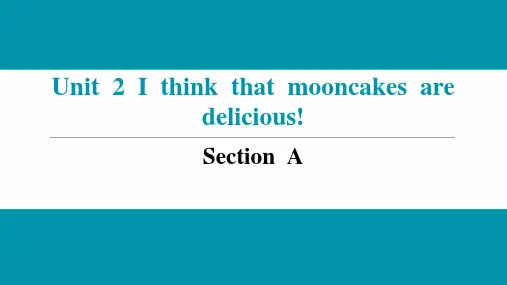
They go on the streets to throw water at each other.
April is the hottest month in Chiang Mai.
3.When is the Water Festival in Chiang Mai?___________________________
It's from April 13th to 15th.
4.What do people do to celebrate the Water Festival?_________________________________________________
C
A. put away B. put off C. put on D. put up
“in+时间段”的用法
【教材原文】I'm going to Chiang Mai in two weeks.我打算两周后去清迈。 “in+时间段”通常用于一般将来时的句子中作状语,对其提问用how soon,意为“多久以后”。例如: His uncle will come back in 40 minutes.→How soon will his uncle come back?
【拓展】(1)wonder+if/whether引导的宾语从句,表示一种委婉的请求和疑问,意为“想知道是否……”
(2)wonder+who/what/why/how引导的宾语从句或“特殊疑问词+动词不定式”结构,意为“想知道谁/什么/为什么/如何……”。例如:I'm just wondering how to do it.我正想知道该怎么做这件事。
【拓展】if与whether辨析if可以表示 “如果”,引导条件状语从句,需要遵循“主将从现”的原则。if表示“是否”引导宾语从句时,一般情况下可与whether互换。但下列情况一般只用whether引导:
April is the hottest month in Chiang Mai.
3.When is the Water Festival in Chiang Mai?___________________________
It's from April 13th to 15th.
4.What do people do to celebrate the Water Festival?_________________________________________________
C
A. put away B. put off C. put on D. put up
“in+时间段”的用法
【教材原文】I'm going to Chiang Mai in two weeks.我打算两周后去清迈。 “in+时间段”通常用于一般将来时的句子中作状语,对其提问用how soon,意为“多久以后”。例如: His uncle will come back in 40 minutes.→How soon will his uncle come back?
【拓展】(1)wonder+if/whether引导的宾语从句,表示一种委婉的请求和疑问,意为“想知道是否……”
(2)wonder+who/what/why/how引导的宾语从句或“特殊疑问词+动词不定式”结构,意为“想知道谁/什么/为什么/如何……”。例如:I'm just wondering how to do it.我正想知道该怎么做这件事。
【拓展】if与whether辨析if可以表示 “如果”,引导条件状语从句,需要遵循“主将从现”的原则。if表示“是否”引导宾语从句时,一般情况下可与whether互换。但下列情况一般只用whether引导:
仁爱版九年级上Unit1 Topic2 Section A课件(共29张PPT)
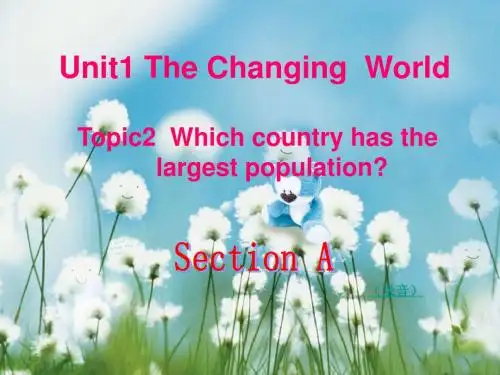
just come back from but Michael has. He has ______ never France. He likes it very much. He says he has _____ been to such a beautiful country before.
yet A: Have you seen him ______? B: Yes, I have seen him ______. already next
Maria has just come back from Cuba.
刚刚
Have you had supper yet?
I’m full. I have already had supper .
I’m hungry. I haven’t had supper yet.
仍然; 还
Have you cleaned your room yet?
Unit1 The Changing World
Topic2 Which country has the largest population?
(录音)
come been come _______ am \ is \ are _______
go
tell
gone _______ told _______
B: Yes, I have … before.
No, I have never … before. ride a horse
watch a movie in the open air
chat online
Where have they been in the holiday?
They have already come back.
仁爱版九年级英语上册课件Unit 1 Topic 2 Section A
【链接】never 多用于否定陈述句, ever 多用于疑问句,问初次经历, just 位于谓语动词以后,before 一 般放在句末。
例如: 1). ---Would you like to go to see the film?
---No, I’ve seen it already. 你想去看电影吗? 不,这部电影我已经看过了。
2. ---I really hate to go shopping. ---So do I. So do I. 为倒装句。
表示前面提到的肯定情况也同样适合另 外一个主题。表示“ 某某也一样” 其 结构“so +be/情态动词/助动词+主语”
例如: Kangkang is a clever student. So Maria is. 康康是个聪明的学生。Maria 也是。
Grammar
1. --Have you found him yet? --Yes ,he has already gone home.
yet, already 是副词,表示“已经,仍然, 还 ”。 already 多用于现在完成时态的肯定句, 可放在句中,也可放在句末。 yet常用在现在完 成时态的否定句和疑问句, 常放在句末。
expressi 2.Have you found him yet?
ons
3.He has already gone home.
Homework
1. Make five sentences, using ever, never, yet, already and just.
2. Preview Section B.
Unit 1 The changing world
Topic 2 The population in developing
人教版九年级上册英语课件:Unit 2 Section A(1a-2d)(共10张PPT)
Unit 2 I think that mooncakes are delicious!
第1课时 Section A(1a-2d)
名师点睛
•词汇冲 • 1.crowded adj.拥挤的。其反关义词为uncrowded(不拥挤的)。短语:
be crowded with挤满了…… • 2.【辨析】believe与believe in。believe表示相信某人的话,而
the races.比尔和玛丽都相信他们明年还会回来观看龙舟比赛。
• 该句包含一个that引导的宾语从句,作动词believe的宾语;在宾语从 句中,to watch the races为动词不定式短语,在句中作目的状语。 【拓展】动词不定式作目的状语既可放在主句前,也可放在主句后。 放在主句之前时,要用逗号与主句隔开。例:To get high grades, he works very hard.=He works very hard to get high grades.为 了取得高分,他努力地学习。
• 9.relative n.亲属;亲戚。【拓展】relative还可作形容词,意为
“相对的;有关系的”。 • 10.throw(threw,thrown)v.扔;掷。短语:throw...at...朝……
扔……,把……洒/抛在……上。throw后接所扔的东西,at后接扔的 对象。
•难句解 • Bill and Mary believe that读they'll be back next year to watch
ut
• 5.Don't eat too much, or you'll p_________ on your weight.
• 6.【2018·浙江杭州中考】The train was vreowrydecd_____________ with passengers, so we had to stand.
第1课时 Section A(1a-2d)
名师点睛
•词汇冲 • 1.crowded adj.拥挤的。其反关义词为uncrowded(不拥挤的)。短语:
be crowded with挤满了…… • 2.【辨析】believe与believe in。believe表示相信某人的话,而
the races.比尔和玛丽都相信他们明年还会回来观看龙舟比赛。
• 该句包含一个that引导的宾语从句,作动词believe的宾语;在宾语从 句中,to watch the races为动词不定式短语,在句中作目的状语。 【拓展】动词不定式作目的状语既可放在主句前,也可放在主句后。 放在主句之前时,要用逗号与主句隔开。例:To get high grades, he works very hard.=He works very hard to get high grades.为 了取得高分,他努力地学习。
• 9.relative n.亲属;亲戚。【拓展】relative还可作形容词,意为
“相对的;有关系的”。 • 10.throw(threw,thrown)v.扔;掷。短语:throw...at...朝……
扔……,把……洒/抛在……上。throw后接所扔的东西,at后接扔的 对象。
•难句解 • Bill and Mary believe that读they'll be back next year to watch
ut
• 5.Don't eat too much, or you'll p_________ on your weight.
• 6.【2018·浙江杭州中考】The train was vreowrydecd_____________ with passengers, so we had to stand.
人教版九年级英语上册课件:unit2 Section A(1a2d)(共13张PPT)
Ⅲ.根据句意完成句子,每空一词。
1. (2018·湖州改编)因为不均衡的饮食,劳瑞体重增加了很多。
Larry has put
on too much weight because of his unbalanced diet.
2. (2018·金华改编)令每个人惊讶的是,他们的计划听起来和我们的相似。
2. The bus was too crowded (crowd) and I was quite uncomfortable(使人不
舒服的).
3. (2018·包头) — Can you tell me the way to the Central Hospital?
— Sorry. I myself am a stranger
— They usually sweep away the dust(灰尘) of the old year and welcome a fresh
start.
A. the Lantern Festival
B. the Spring Festival
C. the Dragon Boat Festival
1. When is the Double Ninth Festival? It's on the ninth day of the ninth lunar month. 2. Does the Double Ninth Festival have a history of 1,700 years? No, it doesn't. 3. What do two “ninths” meeting together stand for? They stand for a long life. 4. Who do people celebrate the Double Ninth Festival for? For their elders. 5. What do people traditionally drink and eat on the festival? Chrysanthemum wine and Double-Nine Cakes.
人教版英语九年级全册Unit 2 Section A 1a-2d 课件
Harry wonders whether_J_u_n_e__is_a__g_o_o_d_t_im__e_. Wu Ming thinks that _J_u_n_e_i_s_a_p_e_r_f_e_ct__ti_m_e__to__v_is_i_t.
Task 5 Listen to the conversation between Wu Ming and
1. Wu Ming and Harry are _________.
A cousins B strangers 陌生人 C friends
2. Wu Ming went to _________for his vacation.
A Singapore B Hong Kong C Macao 澳门
3. Wu Ming visited his ________.
lot there. He said: “I believe that we ate at least five meals a day! How delicious the food is!pIu'vteo_n_f_iv_e__p_o_u_n_d_s_____!”He also went shopping.He thinks that Hong Kong is a good placeshopping for_sp_e_n_t___ He______so much money. And Wu Ming liked the Dragon Boat Festival in June bestto. oBhuottit was _____ to see the boat races in June.Harry didn’t mind hot weather. So WuMing tpheirnfekcstit’s a _____time for him to visit Hong Kong.
Task 5 Listen to the conversation between Wu Ming and
1. Wu Ming and Harry are _________.
A cousins B strangers 陌生人 C friends
2. Wu Ming went to _________for his vacation.
A Singapore B Hong Kong C Macao 澳门
3. Wu Ming visited his ________.
lot there. He said: “I believe that we ate at least five meals a day! How delicious the food is!pIu'vteo_n_f_iv_e__p_o_u_n_d_s_____!”He also went shopping.He thinks that Hong Kong is a good placeshopping for_sp_e_n_t___ He______so much money. And Wu Ming liked the Dragon Boat Festival in June bestto. oBhuottit was _____ to see the boat races in June.Harry didn’t mind hot weather. So WuMing tpheirnfekcstit’s a _____time for him to visit Hong Kong.
- 1、下载文档前请自行甄别文档内容的完整性,平台不提供额外的编辑、内容补充、找答案等附加服务。
- 2、"仅部分预览"的文档,不可在线预览部分如存在完整性等问题,可反馈申请退款(可完整预览的文档不适用该条件!)。
- 3、如文档侵犯您的权益,请联系客服反馈,我们会尽快为您处理(人工客服工作时间:9:00-18:30)。
5. I wonder if it‟s similar to the water festival of
the Dai people in Yunnan Province.
我想知道它是否和云南的傣族的泼水节相似。
similar 是形容词,意为“相似的;相像的”,
无比较级,常用短语“be similar to…意为
2d Role-play the conversation.
Clara: Guess what? I‟m going to Chiang Mai in two weeks. Ben: Wow, sounds like fun! But I believe that April is the hottest month of the year there. Clara: Yes, that‟s true. But there‟s a water festival from April 13th to 15th. Ben: I wonder if it‟s similar to the Water Festival of the Dai people in Yunnan Province.
What do you like best about the Chinese Spring Festival?
I love the food, I think that they are delicious.
What do you like best about Water Festival?
A: What did you do on your vacation?
B: I visited my cousins. I think that we ate
five meals a day! I‟ve put on five pounds!
A: I guess the food was delicious, right?
Whether : “是否”;是…(还是), 表示迟疑或两 个可能性之间的选择或两种情况都真实,其后 可与or ( not) 连用。可引导主语从句、表语从 句、宾语从句、让步状语从句等,引导主语从 句时可置于句首 If : “是否”, 引导宾语从句。一般不与or (not) 连用。也可引导状语从句,意为“如果”
“与
…相似”。
She is similar to her mother.
Mid-Autumn Festival
Mid-Autumn Day(中秋节)
Date: August 15th on lunar calendar
Moon cake(月饼)
Round baked cake with fillings in it.
I don’t like Water Festival, I think that getting wet is terrible.
What do you like best about …? I love... I think... Now let’s talk about the festival with your partner and make your own conversation.
Clara: Yes, I think so. This is the time of the Thai New Year. People go on the streets to throw water at each other. Ben: Cool! But why do they do that? Clara: Because the new year is a time for cleaning and washing away bad things. Then you‟ll have good luck in the new year.
centuries. Mooncakes are in the shape of a full
moon on the Mid-Autumn night. They carry
people‟s wishes to the families they love and miss.
2b Wu Ming did a lot of fun activities, but there were also downsides. Listen again and fill in the chart.
Fun activities Eating out Downsides He put on five pounds. He spent so much money. It‟s quite hot.
Lantern Festival, January 15
Dragon Boat Festival, May 5
Mid-autumn Day, August 15
Easter around March 22--April 25
Halloween October 31
Halloween Parade(游行)
I loved the races! But I guess it was a little too crowded.
1. _____The Water Festival in Thailand d 2. _____The Dragon Boat Festival in Hong a Kong 3. _____ b Chinese Spring Festival in Beijing 4. _____ c The Lantern Festival in Jiangxi
4. I‟ve put on five pounds! 我都胖了五镑了! put on意为“增加(体重);发胖”。 ►I can eat what I want but I never put on weight. 我能想吃什么就吃什么,但是从来不发胖。
put on的其他用法
意为“穿上;戴上” She put on her coat and went out. 意为“上演;举办”
1c Talk about the festivals in 1a.
A: What do you like best about the
Dragon Boat Festival?
B: I love the races. I think that
they‟re fun to watch.
2a Listen to the conversation between Wu Ming and Harry and circle the correct words in the sentences. 1. Wu Ming and Harry are cousins / strangers / friends. 2. Wu Ming went to Singapore / Hong Kong / Macao for his vacation. 3. He visited his relatives / friends / classmates. 4. He liked eating out / shopping / the Dragon Boat Festival best.
Language Points
1. –What a great day! 多么美好的一天! What a great day!是由what引导的感叹句。 What 意为“多么;真;太”,用作定语,修饰名词。
此处句式结构为:What+a/an+形容词+可 数名
词单数形式(+主语+谓语)!, 口语中常可以省
3. Wu Ming and Harry are cousins / strangers / friends. 吴明和哈里是表兄弟/陌生人/朋友。 stranger作名词,意为“陌生人”,是由形容 词 strange加后缀-r构成的名词。 ►A stranger walked up to me and shook my hand. 有个陌生人向我走来跟我握手。
Shopping
Dragon Boat Festival in June
2c Role-play conversations between Wu Ming and Harry. Use the information in 2a and 2b or make your own conversations.
Unit 2
I think that mooncakes are delicious!GuBiblioteka ssing Competition:
Guess what festival it is according to the picture you see as quickly as you can.
Spring Festival January 1
Do you know the story of chang‟e?
3a Read the passage about Mid-Autumn Festival and answer the questions.
Chinese people have been celebrating Mid-
Autumn Festival and enjoying mooncakes for
略主语和谓语。
e.g. What a new watch ( it is)!
多么新的一块手表啊!
2. Bill wonders whether they‟ll have the sweet rice dumplings again next year ⑴ wonder作动此处意为“想知道; 想弄明 白”,相当于 want to know。 I wonder what the new teacher will be like 我想知道新老师是什么样。 ⑵I wonder whether…意为“我想知道是 否…”,相当于I wonder if 是一个请求允许的交 际用语,询问对方是否允许自己做某事。 “I wonder whether /if I could use your bike. 我想知道我是否能用一下你的自行车。
